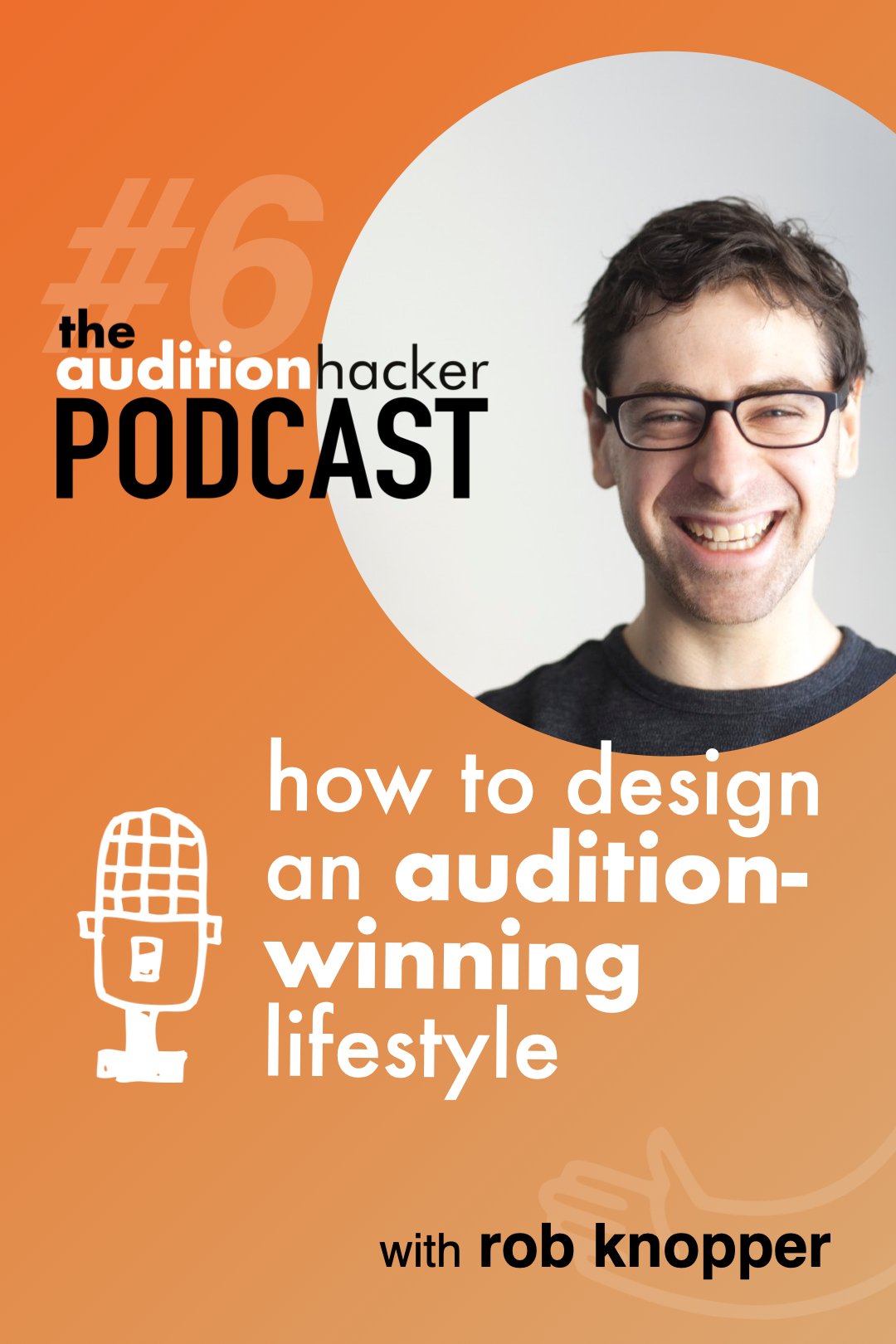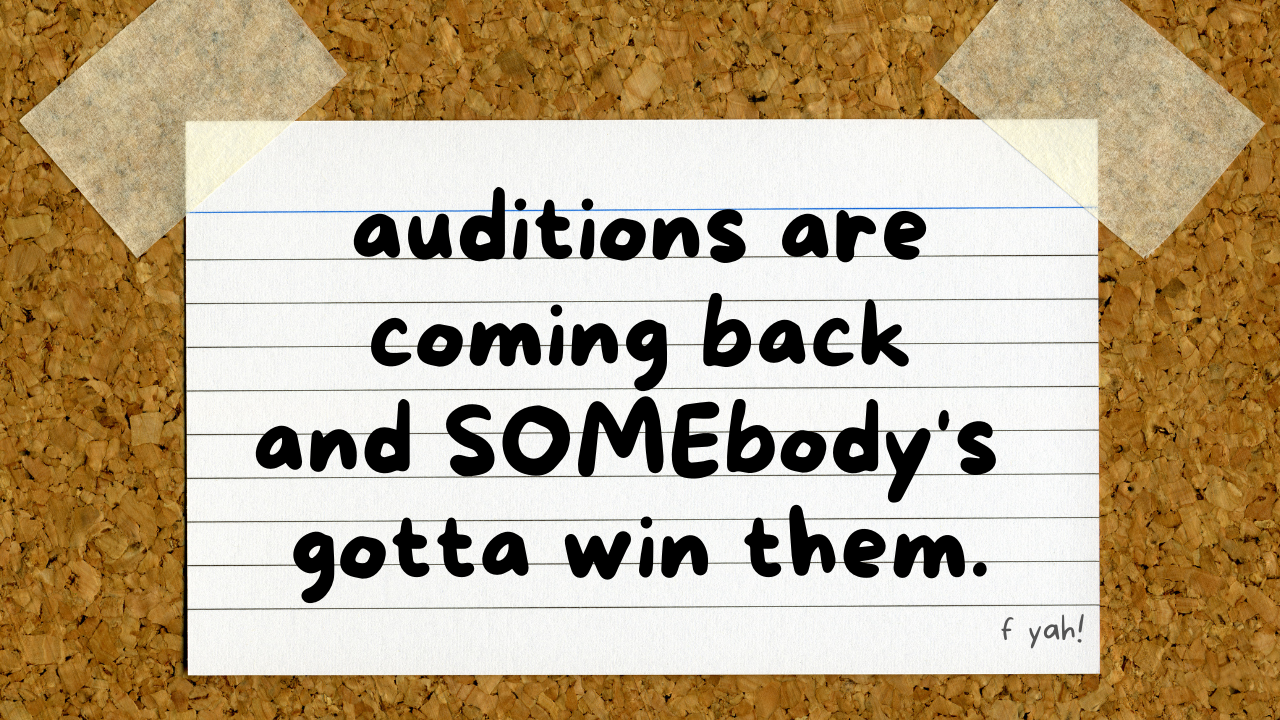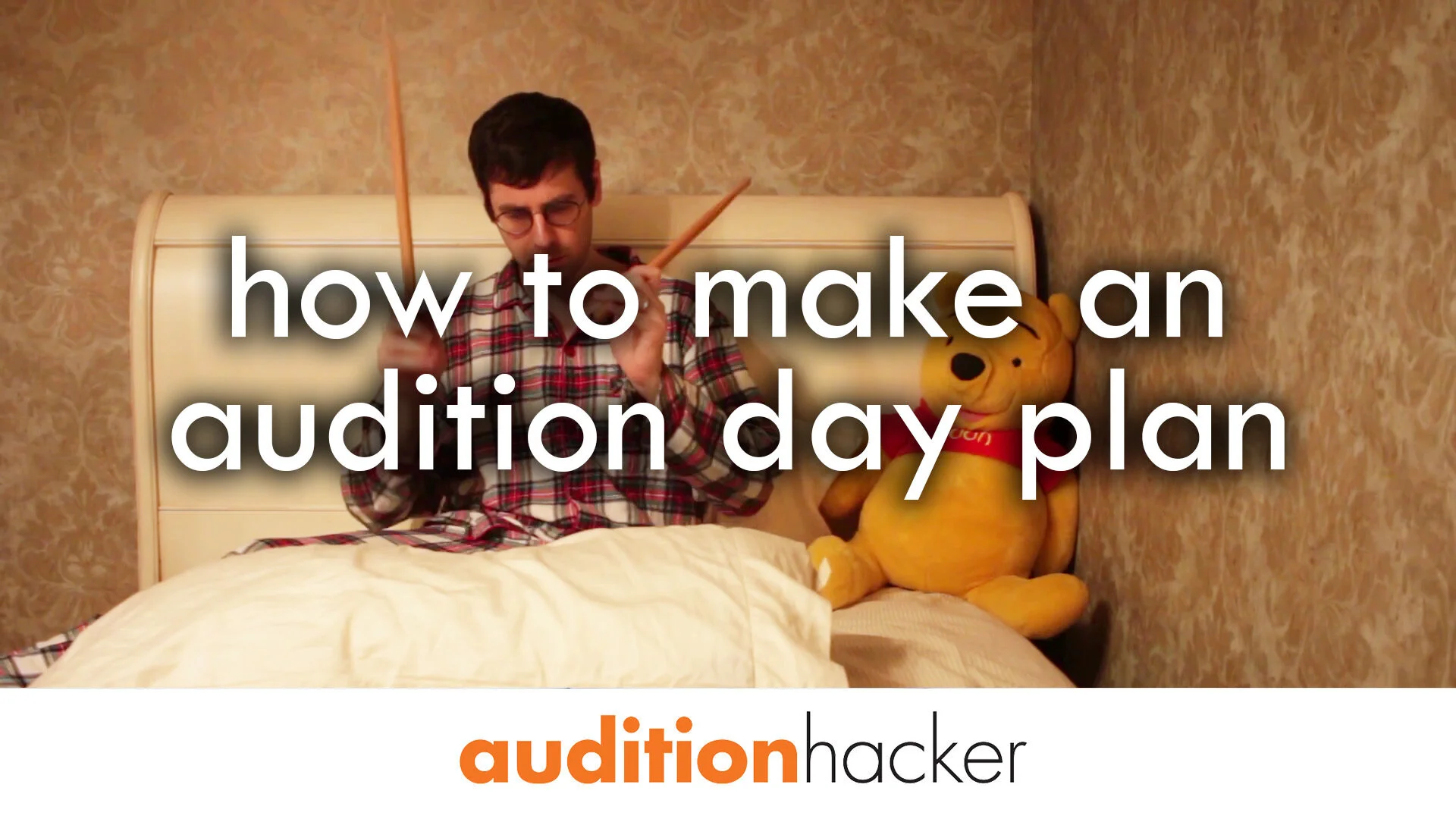photo: steven white
last week we talked about recovering from a disappointing audition with an audition pivot. remember?
first you wallow in shame and dejection, then you get desperate and realize that you have to do something new, and finally you decide on some concrete actions you’re going to take to make next time better.
these audition pivots can also lead us musicians down some unusual paths. they cause us to come up with some… shall we say… unusual strategies.
if you're here reading this, that probably means you haven’t found your ideal audition preparation plan yet. you should be a sponge, soaking up every fresh practice method you can. anything that worked for an audition winner just might work for you.
introducing parker lee, principal timpanist of the metropolitan opera since 2017.
parker took a standard audition strategy and did the exact opposite.
you might have heard of the idea of a ‘highlight reel,’ where you record your best versions of your excerpts and listen back. it helps remind yourself of how you sound at your best, and to gain the confidence in those critical moments where you doubt if you can rise to the challenge.
well instead of that, he prepared for his winning MET orchestra audition by listening to the worst versions of his excerpts. instead of learning to love his playing through a highlight reel, he learned to hate it.
strategic hate. (or something.)
i’m going to let him explain how it works, and also how he discovered this strategy. (spoiler: it came from a hip-hop artist.)
i talked to him about his entire audition journey, which was a lot of fun because he’s basically as obsessed with audition preparation as i am.
alright, onto the interview.
rob: when did you take your first audition?
parker: i did my undergrad at indiana university, and when i was there i did one audition — for the san diego symphony. i took it just to get the feel of what an audition would feel like. i prepared the way i thought i should prepare, and i tested that process by going to the audition to see what would happen. it didn’t go well. i thought i did well and i thought things sounded a certain way, but people didn’t like it.
rob: was it a shock to you that you didn’t advance?
parker: yeah exactly. i just didn't understand why i got cut. but then i started to get really into developing a better way to prepare. eventually, towards the end of my audition journey, i knew (or had a very good idea) if i was going to advance or not.
rob: what was your next audition after san diego?
parker: after IU i started at the cleveland institute of music. and while i was there, i took detroit symphony and didn’t advance. i got cut off in the first round.
one thing that happened in that audition is that i brought my recorder into the audition like normal, but when i listened back, i didn’t understand why i got cut. i dwelled on tiny issues and i hated that feeling. so, i decided that would be the last time i would record my audition.
i want to do so much self-recording during the preparation that i don’t have to record. if i’m in tune with my tendencies and know my playing extremely well, i'll know exactly how it went without listening back. by audition day, there should be so many mock auditions that i don’t have to say “let me listen back and see how that went” anymore. by that time, i know how well it went.
R: so you’re a big proponent of self-recording. did you do that at CIM?
p: huge. at first, when i was doing this at CIM, i was recording myself and listening back haphazardly. i’d play and hope that it was going to sound good, and then i'd listen back in this hopeful manner and say, “oh, that was ok i guess.” i’d only listen back once and come up with a conclusion, like, “hmm, maybe i’ll try to play with the metronome.” that's not effective. you need to soak in what the first take really sounds like.
R: the first take with all the initial problems? what do you mean?
p: yep. here’s how i do it.
the first step, before i do any recording, is to get all the excerpts to the level of at least being able to play through them. as long as i don't stop or mess up, they’re ready for take 1.
then i record everything. and whatever happens, even if i mess up in that recording, i'm stuck with it. i upload the recordings to a private link on soundcloud. [editor’s note: no, parker did not share the private link with me.]
R: ok. so how do you use these initial takes?
p: the point is to live with your first take.
let’s say you listen to your initial beethoven 9 recording and the pitches (A and D) are out of tune. you could just record it again and do it better. but i think that’s bad. instead, you force yourself to live with that flawed recording for like a week.
during the day, you spend your practice sessions working on beethoven 9. but outside of the practice room you listen constantly to that initial take. you’re driving to school... and listening to the initial take. you’re walking along and listening to the initial take. whenever the time is bad or you hear an out-of-tune thing, it creates this emotional response. and what happens is you become super familiar with your tendencies at a core level.
here’s the key: resist the urge to re-record it. let the weight of these problems settle with you.
R: what if a mistake is just a fluke?
p: even if you have a take where you literally stop and you have to start again, that's still the take you should listen to for a week.
it's worth it. it's important. if you think to yourself "oh, i just had a memory slip, i'll do it again." no, no, no! why'd you have a memory slip? you should hear yourself make that mistake because, i guarantee you, you will NEVER do it again.
for me, if i mess up something in a mock audition, i never mess up the same thing again. because when people are listening and there's pressure, the mistake has this weight. you remember it. it's not meaningless.
if a mistake doesn't mean anything to you, you'll never fix it. it should make you mad.
but it even goes deeper than getting mad at yourself for technical issues. it also inspires a more creative way of thinking. while you’re listening you’ll think of things like, “oh, wouldn't it be cool if i did this?" you don't have the instrument in front of you to waste time, so it's all just planning where you're going to go next.
after all of this listening, when you record again, you'll be shocked. you'll feel like a different musician than you were the last week.
R: does this strategy have a name? did anyone teach it to you?
Baauer
p: the way i got the idea is a little bit odd. there’s an interview with this famous music producer named Baauer where he talks about using this method for improving tracks. (i used to make electronic compositions and got really into the EQ and the mixing.)
when he would make a song, he'd spend an hour or two just getting the idea out of his head without caring about quality. and then, just like i’ve been saying, he'd force himself to listen to that for the next two weeks or so. it was genius.
as you listen, every time you hear something wrong with the balance of the audio or some stupid hi-hat you don't like, it really sits with you. every time you listen to it it's like, "oh man, the hi-hat should sound like this," or, "man that really is too much bass," or, "man that's really too loud." you end up kind of hating the song, but you hate it in a really creative way. the next time you get the opportunity to go work on the track again, you're just bursting with ideas. by the time you go back you've got so many ideas that you just can't wait to get them all out.
want to nail your next audition?
here’s the 5-part audition preparation method that i used to win a job in the MET orchestra.
the best part? it works for every instrument.
R: how do you go from the Baauer method to audition day?
p: ok. so far we've brought the excerpts to play-through level, and i’ve done the Baauer method. this is the most zoomed-in type of practice, and from here i’ll keep self-recording.
then i’ll start mock auditions, which includes recording them and listening to them at home.
my very first standard for the excerpts starts at "was it right and did i get through it?” but as i get closer to the audition when i should be in really good shape, it's "is that the right sound?”, "is that the right phrasing?”, and "did i feel something?” all the fundamental problems should be worked out. they should be built into it to the point where i’m not even thinking about it anymore. then i zoom out even more and think about the overall arching of the audition as if it were a recital.
R: so towards the end of your audition prep, you're completely ignoring the precision issues and little mistakes?
p: absolutely. in mock auditions, if i hear a little issue, i don't have time to go back and fix it in the same way i would during the early stages where i'm building them up. i don’t associate any negative or positive emotions with anything. if i hear a weird time thing, i just acknowledge it by saying, "huh, ok, i rushed a little bit," and try it again tomorrow.
when you go to the audition, your goal can never be "oh i gotta play really even and in tune." if that's your goal, the second something is a little out of tune or a little uneven, you've failed at your goal and it's going to get in your head. but if you trust yourself and you've worked these things out, you just want to go in and play a recital. each piece has its own character and you want to convey the spirit of the music.
R: let’s talk about audition rejection. when you would get cut from an audition, how did you recover?
p: audition preparation is very stressful. it's ok to take a week off or so. of course you're going to be upset. but if this is what you want to do and you love music and you love playing, the fire is going to come back. you're only going to be out for a couple days before you're thinking "ok i'm gonna do this thing a little bit different, this is how i tweaked this,” and you're going to kind of get these ideas of "oh man, i kind of can't wait to prepare for the next one because i think i know what's missing.”
a good example is north carolina, which happened one full year before the MET. i was runner-up and of course i was bummed about it. i also knew there wasn't going to be another timpani audition for at least a year. i had a choice to make: i could wait for the list to come out OR i could be the guy who spends that whole summer going back to basics. i decided to go back to the top 20 standard excerpts and really figure out and rethink how i'm going to play these.
auditions are a very continuous thing. it's not like you can audition, take a break, audition, and take a break. if you're constantly learning about everything over the course of many years, the auditions are just kind of checkmarks or benchmarks. maybe this next audition will work out, but if not, you're still on this upward trajectory.
R: you're building this kind of momentum or life trajectory and the auditions are just tests along the way.
we couldn’t let this shot of parker go to waste. photo: steven white
p: exactly. they're not endgames at all. they're really actually nothing. they’re not the reason i got into this in the first place. the goal was almost never to get a job. i just loved timpani and wanted to be a great timpanist, so i took auditions along the way. i mean, of course i wanted a job, but you can't put that much pressure on yourself. you can't think "i need this," or "this is it." there will always be more auditions and you'll be better each time.
R: so on your journey of auditions, was there something special about the MET? why do you think this ended up being the one you won?
p: at that point, i was a bit numb to things. i had taken enough auditions and i had been close enough times that i had to stop associating emotions with outcomes. it's too much pressure to put on yourself.
i remember in north carolina, the audition right before the MET, i somehow put so much pressure on myself where i thought, for whatever reason, that was the perfect job for me. and because i didn’t get it but i was so close, it was a bit devastating and i promised myself that i would never put that pressure on myself again. i figured that if i just play the way i play, someone will connect with it eventually and it will lead me naturally to getting the right job.
so in preparing for the MET, i didn’t put pressure on myself. i approached it with the attitude that it was just what i was doing with my life at that time. i was just preparing for auditions. i remember thinking, "omaha is next, seattle might be opening up, but first I’ll take the MET and see what happens." i really didn't expect to win, and i had even convinced myself that i wouldn't win.
R: so the second you chose to not care if you won, you immediately won. wow.
p: absolutely. i had figured out this process and i was preparing so automatically that it didn't feel intense. it didn't feel like “omg the MET, omg the MET." it was like "oh, whatever. the MET. it's an audition." it's hard to explain. it was pretty casual.
R: do you have any final tips to give students?
p: so. i have a job now. when i look back and think about what i did, all that happened was that i strung together a really consistent long string of small victories. and those small victories are just single days. that's it. just win today.
you don't win the audition at the audition. you win the audition so long before that. i really think that. it’s easy to worry, "oh will i ever be able to win a job?"
just fix one thing today, and do that every day for a long time.
if i focus on music for 4-6 hours, i can go do whatever else i want and feel good knowing that i did all i could do today. i can hang out with my friends and just celebrate the 6 hours i practice today. you don't need to have the guilt of, "oh there's so much more i could do, what am i going to do?” just win the day.
R: yeah, i love it! thanks parker.
want to nail your next audition?
here’s the 5-part audition preparation method that i used to win a job in the MET orchestra.
the best part? it works for every instrument.















in 2019, a cellist named maria reached out to me about her audition struggles. on paper, she was the “worst audition candidate ever” (her words). she had 2 small children, a full-time teaching job, and hadn’t taken an audition in 4 years.